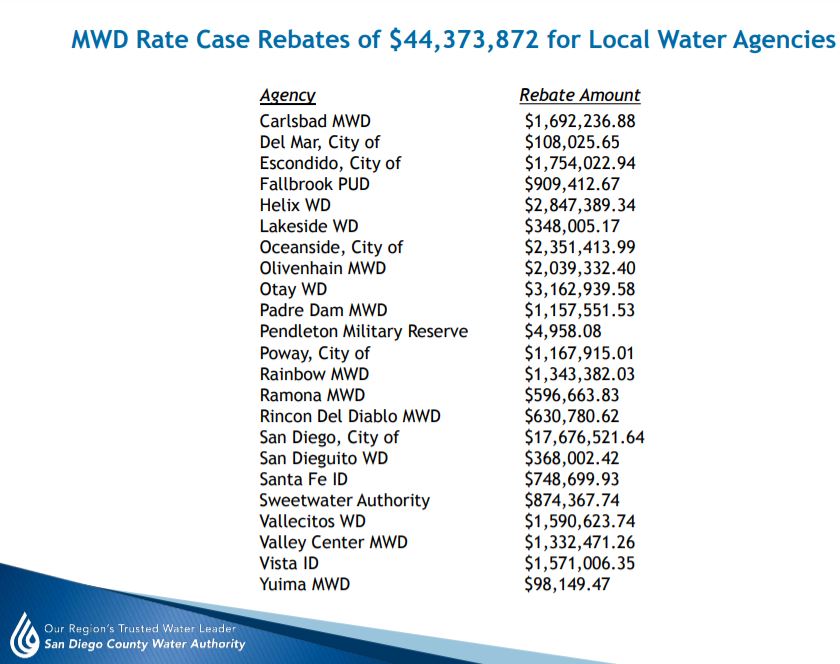The San Diego County Water Authority’s Board of Directors today announced a plan to distribute a rebate of $44.4 million to its 24 member agencies across the region after receiving a check for that amount from the Los Angeles-based Metropolitan Water District of Southern California to pay legal damages and interest.
The money resulted from the Water Authority’s decade-long rate case litigation in state Superior Court seeking to compel MWD to set legal rates and repay overcharges. The Water Authority won several critical issues in cases covering 2011-2014 and was deemed the prevailing party, which means the agency is also owed legal fees and charges in addition to the recent damages and interest payment from MWD.
The court rulings will also help avoid future overcharges and thereby minimize future disputes over MWD’s unlawful Water Stewardship Rate for transporting the Water Authority’s independent water supplies through MWD facilities. Those charges – if they had continued – would have cost San Diego County residents more than $500 million over the life of the Water Authority’s water delivery contract with MWD.
“A long time coming”
“This day has been a long time coming,” said Water Authority Board Chair Gary Croucher. “We never wanted to litigate these issues – but if we had not had the courage to do so, MWD would still be collecting the illegal fees and we would not have money to give back to local retail water agencies across the region.”
Per today’s decision by the Water Authority’s Board, the $44.4 million will be returned to member agencies in proportion to their overpayments between 2011-2014. The Water Authority does not have a say in how member agencies use the refunds. The amount of legal fees and costs owed to the Water Authority is yet to be determined.

In addition to damages and interest, the rate case lawsuits generated other substantial benefits, such as requiring an increase in the Water Authority’s preferential rights to MWD water by approximately 100,000 acre-feet a year, equivalent to about twice the annual production of the $1 billion Carlsbad Desalination Project.
In February 2020, the Water Authority’s Board of Directors voted to dismiss certain issues from the litigation after securing more than $350 million in local project subsidy benefits for the San Diego region. In doing so, the Water Authority acknowledged the MWD Board action to stop imposing its Water Stewardship Rate for transporting the Water Authority’s independent supplies, thus resolving for now that issue in future rate years.
As the lawsuits wind down, the Water Authority is working collaboratively with MWD member agencies across Southern California to update MWD’s long-term water resource and financial plans. MWD’s Integrated Resources Plan, known as the IRP, will be the agency’s roadmap for the future. The Water Authority is advocating for inclusion of updated data and plans by many MWD member agencies to develop local water supplies such as the Water Authority and its member agencies have done over the past two decades and will continue to do in the future.





